|
|
|
Sort Order |
|
|
|
Items / Page
|
|
|
|
|
|
|
| Srl | Item |
| 1 |
ID:
172335
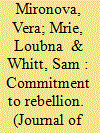

|
|
|
|
|
| Summary/Abstract |
What sustains commitment to rebel fighting during civil war? Using original survey data from the ongoing conflict in Syria, we examine whether self-ascribed rebel fighters, former fighters, civilians, and refugees can be clearly differentiated based on commitment to rebellion. We ask whether such groups are better characterized as a broadly holistic fighting community or a heterogeneous mix of actors with different levels of support for violence. Using a well-balanced sample of over 300 active and former rebel fighters, civilians from within the conflict zone, and externally displaced refugees, we observe that fighting commitment is greater among active combatants compared to other cohorts. To understand why, we examine underexplored psychological mechanisms and find that individuals with higher risk tolerance, optimism bias, and identity fusion with rebel forces display greater dedication to fighting. We discuss the implications of our results for understanding who participates in civil war violence and why.
|
|
|
|
|
|
|
|
|
|
|
|
|
|
|
|
| 2 |
ID:
182684
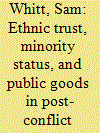

|
|
|
|
|
| Summary/Abstract |
This study considers how ethnic trust and minority status can impact the ability of ethnic groups to pursue cooperative public goods, focusing on groups with a history of conflict and lingering hostility. A public good experiment between ethnic Albanians and Serbs in postwar Kosovo reveals that subjects contribute far more to a mutually beneficial public good when they are part of an experimentally induced coethnic majority. However, when in the minority, subjects not only underinvest, but many actively divest entirely, privatizing the public good. Majority/minority status also has wide-ranging implications for how individuals relate to real-world public goods and the institutions of government that provide them. Compared to majority Albanians, survey data indicate how minority Serbs in Kosovo express greater safety and security concerns, feel more politically, socially, and economically excluded, are more dissatisfied with civil liberties and human rights protections, and are less likely to participate politically or pay taxes to support public goods. Conflict-related victimization and distrust of out-groups are strong predictors of these minority group attitudes and behaviors. This suggests a mechanism for how conflict amplifies out-group distrust, increasing parochial bias in public good commitments, especially among minorities who are wary of exploitation at the hands of an out-group majority. To restore trust, this study finds that institutional trust and intergroup contact are important to bridging ethnic divides that inhibit public good cooperation.
|
|
|
|
|
|
|
|
|
|
|
|
|
|
|
|
| 3 |
ID:
147834
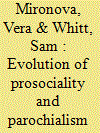

|
|
|
|
|
| Summary/Abstract |
To what extent can prosocial norms (re-)emerge among rival groups following intense intergroup conflict? One school of thought posits that violence can strengthen intragroup bonding norms, entrenching parochialism and sustaining in-group biases. However, recent studies suggest that intergroup bridging norms can also improve once conflict ends. Our research offers insights into how prosocial bridging vs. parochial bonding norms evolve after violence. To measure dynamics of social norms, we employ surveys and dictator game experiments with ethnic treatments which we administered in Bosnia in 2003 and replicated in 2013 using well-balanced samples of ethnic Bosniaks, Croats, and Serbs in a difference-in-difference research design. We find that prosocial bridging norms improve over time. However, we also observe persistent parochial biases in terms of how in-groups are perceived and treated relative to out-groups. Regression analysis shows that intergroup bridging norms are more salient among individuals who reside in ethnically intermixed, institutionally integrated regions of Bosnia, including those who experienced traumatic forms of wartime victimization. Covariate matching on internal displacement and victimization reduces concerns that our results are driven by selection effects. Our findings lend support to the view that integration and intergroup contact among former rivals increases prosociality while partition and social segregation encourage parochialism.
|
|
|
|
|
|
|
|
|
|
|
|
|
|
|
|
| 4 |
ID:
093721
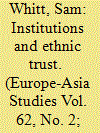

|
|
|
|
|
| Publication |
2010.
|
| Summary/Abstract |
This study considers the prospects for rebuilding trust in a multi-ethnic society with a history of ethnic violence. Findings are based on survey data from a stratified random sample of 681 Bosnian Serbs, Croats and Bosniaks, conducted between September 2003 and January 2004. The data indicate significant trust problems in Bosnian society both within and across ethnicity. However, the study also finds strong linkages between ethnic trust and trust in institutions, suggesting that institutions can play a vital role in restoring ethnic trust and promoting reconciliation.
|
|
|
|
|
|
|
|
|
|
|
|
|
|
|
|
| 5 |
ID:
156535
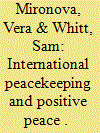

|
|
|
|
|
| Summary/Abstract |
To what extent can international peacekeeping promote micro-foundations for positive peace after violence? Drawing on macro-level peacekeeping theory, our approach uses novel experimental methods to illustrate how monitoring and enforcement by a neutral third party could conceivably enhance prosocial behavior between rival groups in a tense, postconflict peacekeeping environment. Using a laboratory experiment in postwar Kosovo, we find that third-party enforcement is more effective at promoting norms of trust between ethnic Serbs and Albanians than monitoring alone or no intervention at all. We then consider real-world extensions for building positive peace across different intervention environments. Using a dictator experiment that exploits heterogeneity in NATO peacekeeping in different regions of Kosovo, our inferences about monitoring and enforcement appear robust to ecological conditions in the field.
|
|
|
|
|
|
|
|
|
|
|
|
|
|
|
|
| 6 |
ID:
173895
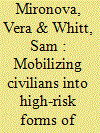

|
|
|
|
|
| Summary/Abstract |
We consider whether prior political activism increases the likelihood of engaging in higher-risk forms of violent collective action. We test our hypothesis in the context of the 2014 Euromaidan and subsequent separatist violence in Eastern Ukraine. In the aftermath of the Euromaidan protests, the Ukrainian government began a widespread campaign to mobilize young men for military service against separatist movements in the Donbas region amid escalating tensions with Russia. In July 2014, we survey young men who were volunteering to join the Ukrainian military’s counterinsurgency efforts and compare them to other young men who live in the same community but had not volunteered. Using a case control study design, we interviewed 100 young men who reported to a local Ukrainian army recruitment station in Kharkiv, a city in Eastern Ukraine which was an important center for military recruitment efforts. We compared them to 100 other young men who lived in the same communities, received recruitment notices, but had chosen not to report. Military recruits were sampled by cluster-sampling at the recruitment station, with random selection of recruits by cluster. Civilian males were sampled by random route in the vicinity of the recruitment station. When comparing survey responses between recruits and civilians, we find strong linkages between prior Euromaidan participation and military mobilization. Our results are robust to controls for parochial ethnocentrism and mere support for Euromaidan goals. Maidan participation and military mobilization are also correlated with a strong sense of self-efficacy, optimism, risk tolerance, patriotic nationalism, and feelings of in-group solidarity with protesters and the military. These correlates illustrate plausible mechanisms for how individuals could transition to increasingly higher-cost, higher-risk forms of collective action.
|
|
|
|
|
|
|
|
|
|
|
|
|
|
|
|
| 7 |
ID:
168998
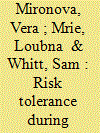

|
|
|
|
|
| Summary/Abstract |
When war breaks out, how important are risk preferences to explaining why some individuals stay in conflict zones while others take flight? We examine risk tolerance among rebel combatants and civilians in Aleppo, Syria using a variation of the Eckel-Grossman Choice Game. Field work in Syria was conducted in 2013–14 with a total of 232 participants to include both Syrian civilians and active rebel fighters in Aleppo and Idlib Province, as well as among Syrian refugees in neighboring Turkey. Compared to Syrians in other locations, people in rebel-held territory of Aleppo, both combatants and non-combatants, are significantly more risk tolerant. We consider possible explanations for elevated risk preferences in Aleppo based on self-selection, adaptive learning, a sense of self-efficacy to affect future outcomes, conflict-related grievances, and in-group solidarity. Our analysis suggests that self-selection based on access to resources and a strong sense of self-efficacy may explain higher propensity for risk-taking. Overall, our results speak to a plausible sorting mechanism during conflict where risk averse individuals select out of conflict, while highly risk tolerant individuals are more prone to discount the inherent dangers of remaining in conflict zones. Our results provide new micro-level explanation for why some societies become mired in conflict traps involving highly risk tolerant fighting communities.
|
|
|
|
|
|
|
|
|
|
|
|
|
|
|
|
| 8 |
ID:
128966
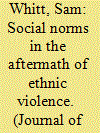

|
|
|
|
|
| Publication |
2014.
|
| Summary/Abstract |
This study considers prospects for the revitalization of social norms after ethnic violence using a behavioral experiment in postwar Bosnia. In the experiment, subjects are asked to distribute a ten-unit monetary sum between two anonymous recipients of random ethnicity. The results indicate a surprisingly high number of egalitarian distributions across ethnicity, which is interpreted as evidence of a norm of fairness. Discriminating behavior in the experiment is explained as a product of ethnic parochialism (rewarding co-ethnics and punishing non-co-ethnics). Overall, the experiment speaks to the resiliency of an important aspect of pro-social behavior after violence-impartiality in the treatment of others.
|
|
|
|
|
|
|
|
|
|
|
|
|
|
|
|
|
|
|
|
|